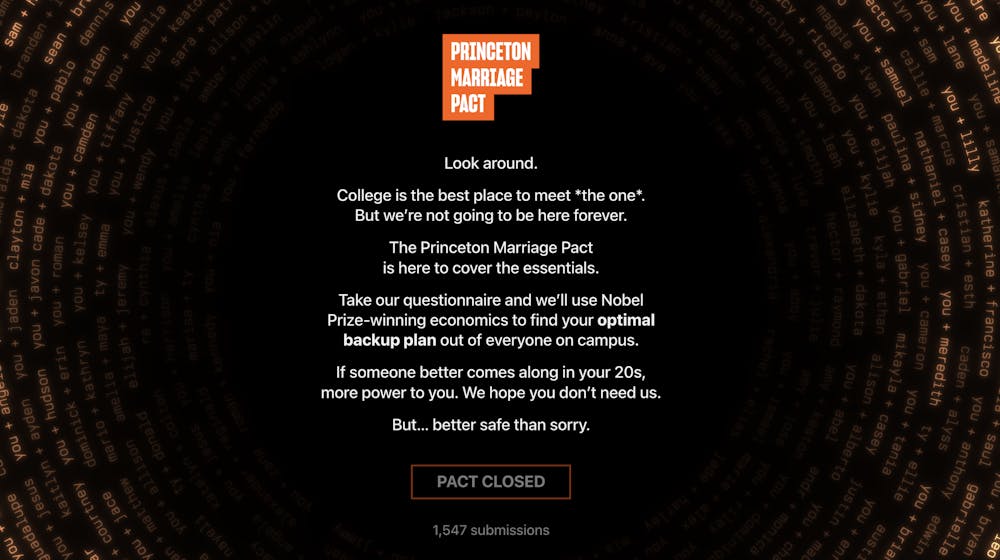On Tuesday, matches were released for Marriage Pact, an algorithm that claims to find students their “optimal backup plan out of everyone from campus.” One question prompted students to decide if they “have strong feelings about [their] partner’s political identity.” If they click yes, they can pick from a range of political identities they’d prefer their partner not have.
This may seem odd at a place like Princeton, where tolerating and even embracing extreme disagreement is praised — rightly — as an intellectual and social virtue. While civil discourse is invaluable in an academic setting, applying this framework to our personal relationships can jeopardize our personal values.
The University says it has a “bedrock commitment” to civil and respectful dialogue, identifying such discourse in direct contrast to “loud or unruly dissent.” University President Christopher Eisgruber ’83 has said that “Ours must be a community where all members can speak their mind and where they engage in civil and respectful dialogue, even on — indeed, especially on — difficult topics.”
Respect is important: Despite what this article’s title might suggest, I’m not advocating for increased polarization or total romantic homogeneity. When an acquaintance, friend, or colleague holds opposite beliefs, maintaining common courtesy ensures both parties feel safe.
But your romantic relationship is different. Your partner’s political choices say something about their values, and their values say something about your values as the person who chose them.
You and your partner did not just fall out of a coconut tree: Entering a partnership with someone is a conscious decision, one that highlights who you are and what you value. In a climate where our political beliefs are tied to our values, your dating choices inevitably say something about you.
To staunchly support President Donald Trump, for example, is to support all the damage he has done. If you’re tolerating that support in your significant other, it’s worth taking a moment to consider the full implications of what it means to support a president like Trump. During Trump’s first term, he attempted to terminate Deferred Action for Childhood Arrivals (DACA) and Temporary Protected Status (TPS) and tried to take away affordable healthcare. In Trump’s first week back in office in 2025, he attempted to end birthright citizenship, issued two executive orders targeting diversity, equity, and inclusion programs, and weakened LGBTQ protections among other regressive executive orders.
Trump has even mobilized Immigration and Customs Enforcement (ICE) — in Princeton itself — and the National Guard to violently arrest and detain undocumented immigrants. Up to 170 legal citizens have been detained following a Supreme Court decision to allow arrests based on race, accent, occupation, or even just standing near a bus stop. Princeton is a diverse community: 61 percent of students are people of color, around 20 percent are members of the LGBTQ community, and 14 percent are international. This is not a matter of politics but respecting members of our community.

If you’re white, straight, and a U.S. citizen, it’s possible that you are not personally affected by your partner’s political decisions at all. It might feel easy to go about your days unbothered and relatively unaffected by your partner’s political affiliations, especially in a bubble like Princeton.
But your romantic partner influences the spaces that you jointly occupy — often most of your spaces, and for married people, maybe approaching all but the workplace. If you value justice and inclusive community, it becomes difficult to cultivate that in your spaces with a partner who does not.
The question of who you are and what you value isn’t confined to the internal and individual: It’s shaped by the people you care about, even and especially when you’re personally unaffected. Remaining apolitical in your relationships because you aren’t affected ultimately perpetuates intolerance.
If you vote blue and want to see a just and inclusive world, you should start by building a just and inclusive community around yourself. And your partner is an essential part of that community. You’re not Switzerland: Your relationship signals to others that you choose to stand by and tolerate ideologies that are hostile and dangerous to your fellow community members. Ending a relationship is never easy, but so many things worth doing aren’t.

Opting for non-confrontation to preserve a relationship that doesn’t align with your values is dismissing the increasingly salient political future ahead of us. You might consider yourself to be a politically knowledgeable and sensitive member of the Princeton community — one who values their fellow community members — but be sure to practice what you preach.
The next time you’re signing up for Marriage Pact, don’t breeze through the political questions: Keep your own values in mind.
Vitalia Spatola ’28 (any pronouns) is a contributing Opinion writer from South River, N.J. intending to major in Anthropology or environmental studies. Vitalia does not, in fact, have a staunchly Trump-supporting boyfriend. Vitalia can be reached at vs2172[at]princeton.edu or @vitaliaspatola on Instagram








